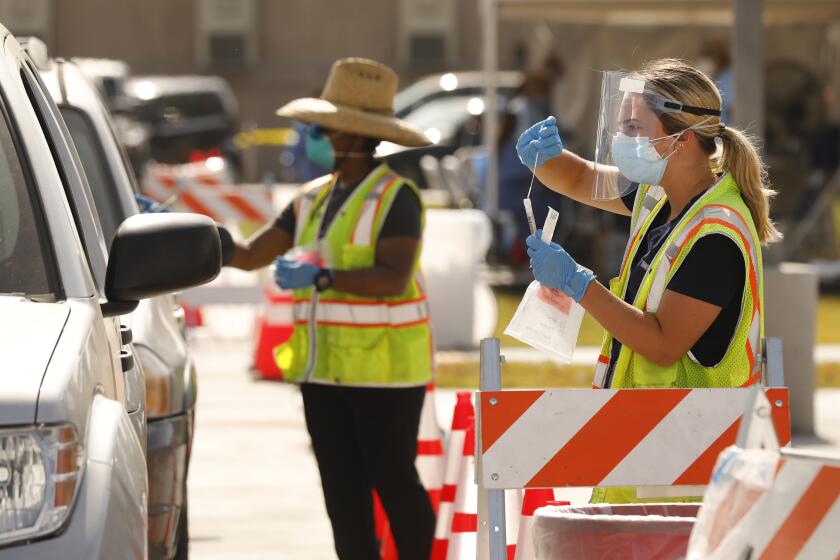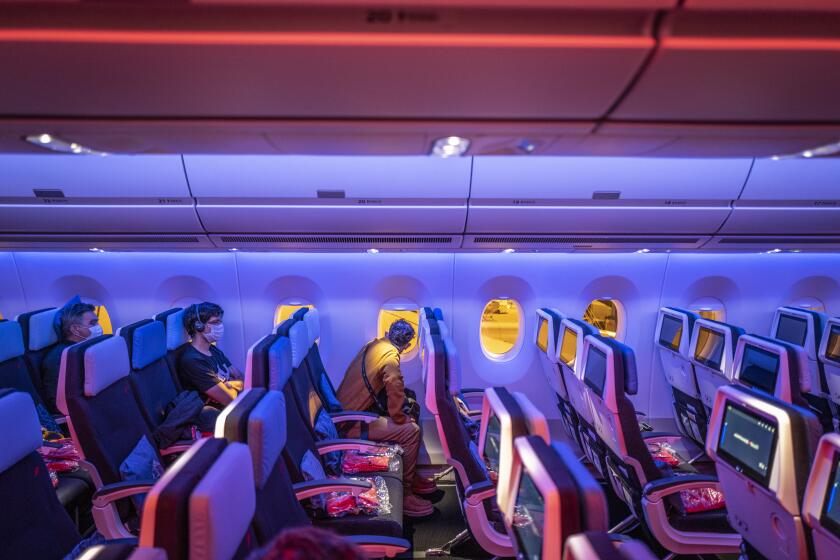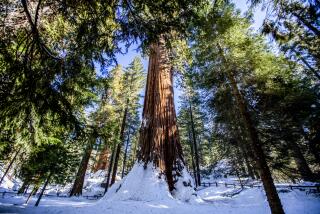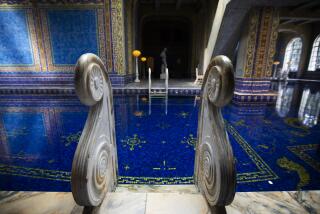As of Aug. 7: What’s open and closed: Southern California beaches, parks, trails
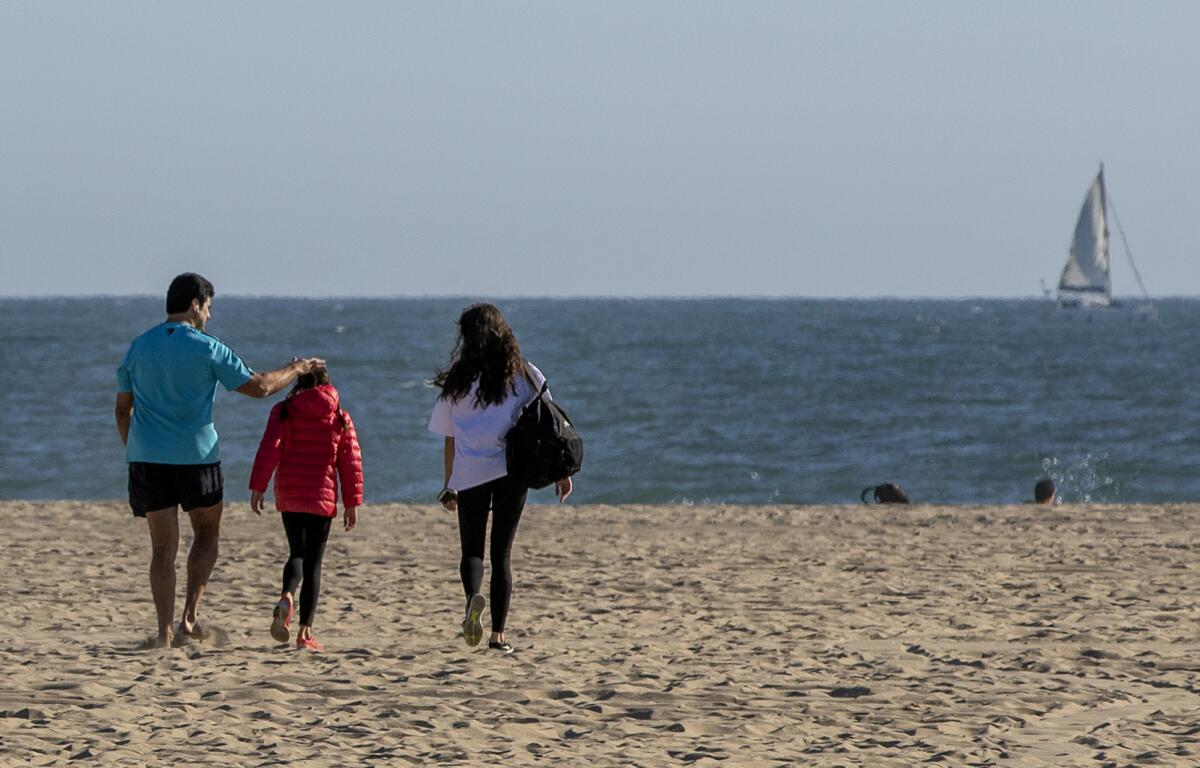
As local and state authorities scramble to limit indoor risks amid rising coronavirus infections, Southern Californians are increasingly looking to parks, beaches and trails for exercise and relief. But recent high temperatures — above 90 degrees in many places — and wildfire outbreaks pose significant challenges in several areas.
Here’s a snapshot:
• In San Bernardino County, the growing Apple fire shut the entire San Gorgonio Wilderness and nearby areas, including parts of the Pacific Crest Trail. Closures include popular trails such as South Fork, Momyer Creek, Vivian Creek, Lost Creek, Fish Creek and Big Falls. The closure order will probably continue until Sept. 1, but could be lifted earlier. The fire started July 31 and was caused by a car malfunction. As of Monday morning, it had grown to more than 32,905 acres and was 45% contained. Evacuation orders were lifted for the communities of Oak Glen; Forest Falls, Pioneertown and Rimrock. Still under evacuation warning: Morongo Valley. Check out road closures and evacuation areas here.
• In Angeles National Forest, firefighters have tamed the Dam fire, which charred about 220 acres near Highway 39 north of Glendora beginning July 30. Roads, including Highway 39, have reopened. But with high temperatures and winds expected, authorities called Monday’s fire danger “extreme.” (Among other things, this means that campfires are prohibited in developed campgrounds.)
• L.A. County’s regional parks remain open for fishing and camping.
“We want to be sure that our families can have staycations,” said L.A. County Parks and Recreation communications director Dora Nuñez.
L.A. County-operated sports fields, however, remained closed until further notice.
• At L.A. County beaches, visitors can bring umbrellas and coolers and relax. Face coverings are required when you are not in the water and when you are around other people. Gatherings, volleyball and other group sports are still banned. Some parking lots and restrooms are still closed.
• The beachside bike path that runs 22 miles from Torrance to Pacific Palisades is open. The route, officially known as the Marvin Braude Bike Trail, is part of a countywide bikeway network. (The Venice Boardwalk and Ocean Front Walk remain closed to most visitors, but the gently curving bike path runs along the sand, separate from the boardwalk and straight-ahead Ocean Front Walk, and remains in use.)
In general, most public spaces are open, allowing hiking, walking, running, biking, surfing and swimming at beaches and lakes. But exceptions and restrictions apply.
Since July 13, when Gov. Gavin Newsom announced a new round of restrictions, indoor dining is again banned at restaurants. Bars and breweries are restricted to outdoor sit-down service with food. Throughout California, dozens of museums are closed. So are bowling alleys, miniature golf courses, batting cages and arcades.
Some zoos and similar facilities, however, are open, including the San Diego Zoo and San Diego Zoo Safari Park, the Living Desert in Palm Desert and the Santa Barbara Zoo.
The governor’s order also forced more than two dozen counties, including Los Angeles, San Bernardino, Orange and Riverside, to shutter gyms, houses of worship, hair salons, malls and other businesses. The order remains in effect indefinitely in counties on the state’s list of highest infection rates.
Details on coronavirus cases county by county are available on the Los Angeles Times’ California coronavirus tracker. The Times also is tracking openings, closures and restrictions at beaches statewide.
And The Times is tracking evolving rules county by county as California’s regions regulate restaurants, bars, retailers, hotels and other businesses while the state fights the coronavirus outbreak. (Los Angeles, Riverside, San Diego and Santa Barbara were among the California counties to close their bars in the last days of June after reopenings were followed by a jump in COVID-19 cases.)
Two months ago, California looked like a coronavirus success story. Now cases and hospitalizations are up and the state is rolling back its reopening.
Around Los Angeles County
• Golf courses are open (no more than four players per tee time).
•The county trails network is open, with at least six feet of distance required; gatherings banned; and face coverings required in parking lots, at trailheads “and on any trails where there are other groups of people nearby.”
• County tennis and pickleball courts are open (singles play only).
• Equestrian centers are open (with various restrictions) and BMX bike areas are open (no rentals).
• Archery and shooting ranges, model airplane areas, community gardens, county campgrounds, RV areas, lake swim beaches and day camps are all open, with restrictions.
In the Greater San Gabriel Valley, three popular garden sites are open, but by appointment only to nonmembers. The Huntington Library, Art Museum and Botanical Gardens in San Marino, Descanso Gardens in La Cañada Flintridge and the L.A. County Arboretum in Arcadia all moved to the reservations-required policy to maintain distancing among visitors.
Get inspired to get away.
Explore California, the West and beyond with the weekly Escapes newsletter.
You may occasionally receive promotional content from the Los Angeles Times.
In other areas, Monrovia Canyon Park is open to visitors who get tickets in advance from 6:30 a.m. to 6 p.m. Mondays through Fridays. The park is closed Saturdays, Sundays and holidays, and access to the Waterfall Trail remains closed. “This trail is narrow and incredibly popular, making it incredibly difficult to ensure safe social distancing,” the website says.
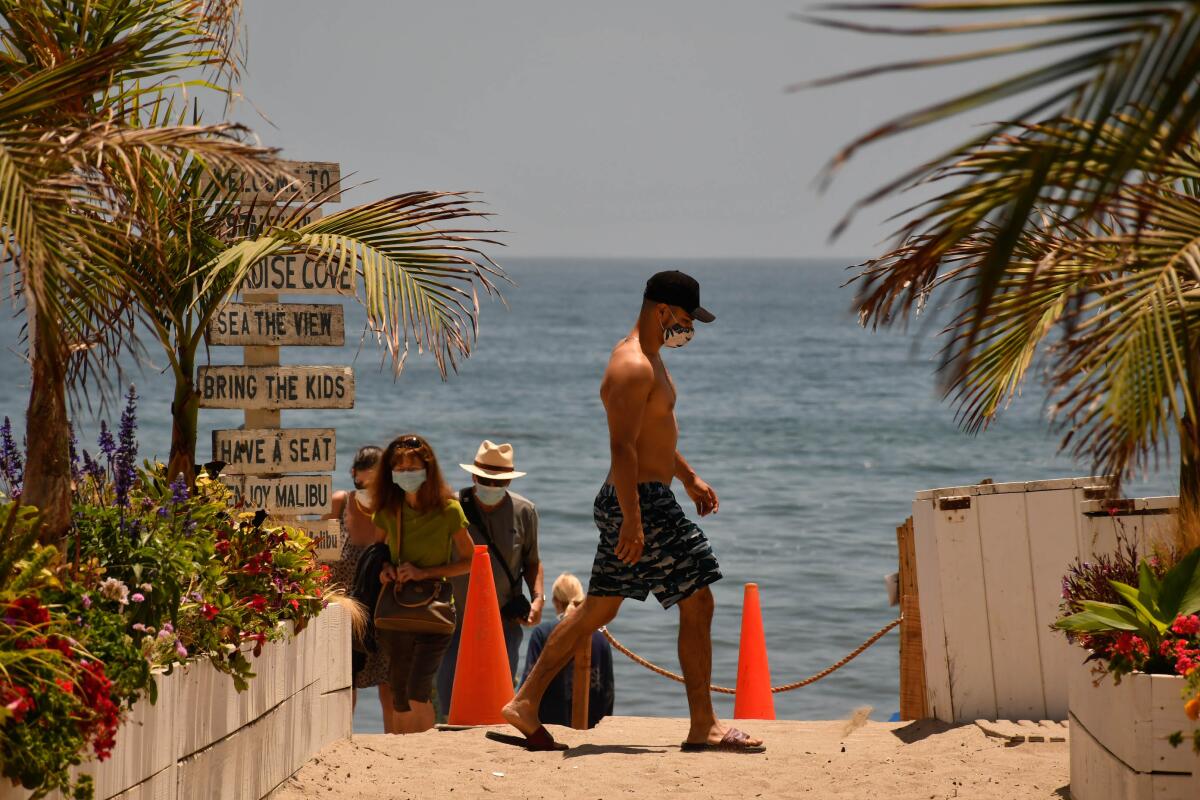
Catalina Island businesses are open and the Catalina Express is running boats between Long Beach (or Dana Point) and Avalon, the island Chamber of Commerce said.
Most Los Angeles County trails will remain open, but Eaton Canyon Natural Area in Pasadena requires advance reservations because of overcrowding. County health officials urge hikers to stay home if they feel ill, to wear a mask and pass other hikers with care, to avoid gathering in groups, and to leave no trace. More details and advice are offered on the county trails website.
L.A. County on July 17 opened 14 splash pads (play areas with water) that will be open through Sept. 30, Tuesdays through Saturdays, 10 a.m. to 6 p.m. The openings come with physical distancing requirements, group gatherings forbidden, “face covering required except in the water.”
The sites are Allen Martin Park, Carolyn Rosas Park, City Terrace Park, Calton Park, Los Robles Park, Mayberry Park, Pathfinder Park, Pearblossom Park, Rimgrove Park, San Angelo Park, Stephen Sorenson Park, Sunshine Park, Valleydale Park and Washington Park.
In addition, the county Friday opened swim beaches at Castaic Lake, Frank B. Bonelli Regional Park in San Dimas and Santa Fe Dam Recreational Area in Baldwin Park. They are to be open through Sept. 9, Thursdays through Sundays, 10 a.m. to 5 p.m.
Pasadena’s Rose Bowl Aquatic Center is operating at reduced capacity, lockers closed and water fountains disabled.
Long Beach’s Belmont Pool reopened June 29 for lap swimming and water exercise, reservations required, showers closed.
Los Angeles city parks and streets
In heavily trafficked Griffith Park, where the L.A. Zoo, Griffith Observatory and many other attractions remain closed, rangers have also closed Wisdom Tree Trail and Burbank Peak Trail.
Though city golf courses and tennis courts have reopened and parks are open, city recreation centers, aquatic facilities, skate parks, playgrounds, baseball fields, soccer fields and basketball courts remain closed.
At popular Runyon Canyon Park, the city website reported that the park was open dawn to dusk with “limited trail access.”
In Los Angeles neighborhoods from West L.A. to Eagle Rock, scores of streets have been barricaded to reduce auto traffic as part of the city’s growing “Slow Streets” program. The idea, city officials have written, is for local residents (not visitors from across town) “to gain access to more space for recreation activities in their neighborhoods, while protecting Angelenos from overcrowding on sidewalks and promoting social distancing.” Residents can apply for “slow street” status and see a map on a city Transportation Department website.
All major U.S. carriers will require masks during the COVID-19 pandemic, Airlines for America, an industry trade group, announced Monday.
Piers at Venice and Cabrillo beaches are closed, even for fishing. The Venice Boardwalk is open to people who grab a bite to eat or shop at a store but not to recreational walkers, cyclists or runners. Also, the Cabrillo Marine Aquarium in San Pedro remains closed, as are the Sherman Oaks Castle and the Expo Center in Exposition Park.
Inland Empire
San Bernardino County has reopened its county parks, lakes, rivers and recreation areas.
Riverside County leaders have allowed golf courses to reopen, with restrictions. Hiking, biking and horseback riding on trails and in parks also are permitted under the county’s health order.
California state parks
State officials continue to urge Californians to stay close to home, but the parks system has been gradually reopening. Of roughly 280 parks statewide, 193 have at least partially opened their parking lots.
Now just 16 state park sites remain closed — including Los Encinos, Pio Pico and Watts Towers state historic parks in L.A. County and Hearst Castle in San Luis Obispo County.
Campgrounds are at least partially open at 85 state parks, but many are booked solid for many weeks ahead. Visitors are advised to visit the COVID-19 resource page to check which destinations and parking areas are open.
Get The Wild newsletter.
The essential weekly guide to enjoying the outdoors in Southern California. Insider tips on the best of our beaches, trails, parks, deserts, forests and mountains.
You may occasionally receive promotional content from the Los Angeles Times.
Santa Monica Mountains
The Santa Monica Mountains National Recreation Area, which straddles Los Angeles and Ventura counties, has reopened most of its trails, parking lots, overlooks and restrooms. Its two visitor centers remain closed, however. Like other agencies, the National Park Service urges hikers to wear face coverings and keep their distance from others.
Also, the Mountains Recreation and Conservation Authority has reopened most of its parks, trails, parking lots and restrooms. The authority manages more than 75,000 acres of open space, much of it owned by the Santa Monica Mountains Conservancy.
National forests in Southern California
Most trails and natural areas are open in Southern California’s national forests. Some areas are closed because of overcrowding during the pandemic.
In the Angeles National Forest north of L.A., three first-come, first-served campgrounds opened in late July with about 100 campsites combined. They are the popular Buckhorn Campground (38 campsites; a forest spokesman advises campers to “get there as early as they can”); the Manzanita Loop of the Chilao Campground (41 sites; bring your own water); and Horse Flats Campground (26 sites, bring your own water).
Also in Angeles National Forest, the gate and road to the Chantry Flat Picnic Area are open but, because of overcrowding, access will be limited. Forest officials will close the gate when the parking lot reaches capacity.
Also, the forest’s Henninger Flats Trail (via Pinecrest Gate) is open and accessible through the Eaton Canyon Nature Center. (Reservations are required to visit the adjacent Eaton Canyon Natural Area.)
The forest’s Roberts Camp above Sierra Madre remains closed on weekends. Picnic areas are open. So are the popular first-come, first-served campgrounds at Sycamore, South Fork and Big Rock. Many other campgrounds and visitor centers are still closed.
In the San Bernardino National Forest, most trails, trailheads, picnic areas and campgrounds are open.
In the Los Padres National Forest, trails and campgrounds are open, except for what’s called the Punchbowl Area in Santa Paula Canyon, which will remain closed until Sept. 30. Hordes of visitors and excessive litter (toilet paper and human feces) prompted officials to shut the narrow Last Chance Trail in the Ojai District as well as Big Cone, Cross, and Jackson Hole campgrounds. For information on different areas, go to the forest’s website for updates about the Monterey, Santa Lucia, Santa Barbara, Ojai and Mt. Pinos areas.
In the Cleveland National Forest, trails are open, but check the website for the status of campgrounds.
National parks in California
All of California’s 11 national parks and recreation areas are now open, though many of their campgrounds and other features are closed.
Among the places still closed: Alcatraz Island (which is part of Golden Gate National Recreation Area) and most of the campgrounds in Yosemite National Park. (This week, park officials extended reservation cancellations through Aug. 15 at most of the park’s campgrounds.)
See a park-by-park list of closures.
More to Read
Sign up for The Wild
We’ll help you find the best places to hike, bike and run, as well as the perfect silent spots for meditation and yoga.
You may occasionally receive promotional content from the Los Angeles Times.
